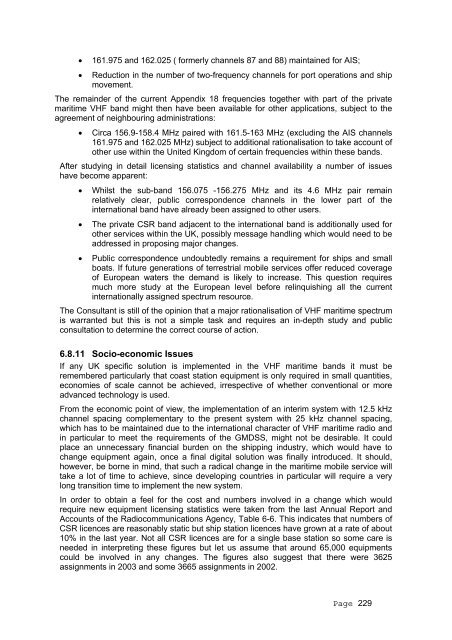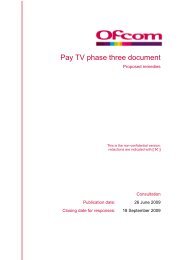FINAL REPORT - Stakeholders - Ofcom
FINAL REPORT - Stakeholders - Ofcom
FINAL REPORT - Stakeholders - Ofcom
Create successful ePaper yourself
Turn your PDF publications into a flip-book with our unique Google optimized e-Paper software.
• 161.975 and 162.025 ( formerly channels 87 and 88) maintained for AIS;<br />
• Reduction in the number of two-frequency channels for port operations and ship<br />
movement.<br />
The remainder of the current Appendix 18 frequencies together with part of the private<br />
maritime VHF band might then have been available for other applications, subject to the<br />
agreement of neighbouring administrations:<br />
• Circa 156.9-158.4 MHz paired with 161.5-163 MHz (excluding the AIS channels<br />
161.975 and 162.025 MHz) subject to additional rationalisation to take account of<br />
other use within the United Kingdom of certain frequencies within these bands.<br />
After studying in detail licensing statistics and channel availability a number of issues<br />
have become apparent:<br />
• Whilst the sub-band 156.075 -156.275 MHz and its 4.6 MHz pair remain<br />
relatively clear, public correspondence channels in the lower part of the<br />
international band have already been assigned to other users.<br />
• The private CSR band adjacent to the international band is additionally used for<br />
other services within the UK, possibly message handling which would need to be<br />
addressed in proposing major changes.<br />
• Public correspondence undoubtedly remains a requirement for ships and small<br />
boats. If future generations of terrestrial mobile services offer reduced coverage<br />
of European waters the demand is likely to increase. This question requires<br />
much more study at the European level before relinquishing all the current<br />
internationally assigned spectrum resource.<br />
The Consultant is still of the opinion that a major rationalisation of VHF maritime spectrum<br />
is warranted but this is not a simple task and requires an in-depth study and public<br />
consultation to determine the correct course of action.<br />
6.8.11 Socio-economic Issues<br />
If any UK specific solution is implemented in the VHF maritime bands it must be<br />
remembered particularly that coast station equipment is only required in small quantities,<br />
economies of scale cannot be achieved, irrespective of whether conventional or more<br />
advanced technology is used.<br />
From the economic point of view, the implementation of an interim system with 12.5 kHz<br />
channel spacing complementary to the present system with 25 kHz channel spacing,<br />
which has to be maintained due to the international character of VHF maritime radio and<br />
in particular to meet the requirements of the GMDSS, might not be desirable. It could<br />
place an unnecessary financial burden on the shipping industry, which would have to<br />
change equipment again, once a final digital solution was finally introduced. It should,<br />
however, be borne in mind, that such a radical change in the maritime mobile service will<br />
take a lot of time to achieve, since developing countries in particular will require a very<br />
long transition time to implement the new system.<br />
In order to obtain a feel for the cost and numbers involved in a change which would<br />
require new equipment licensing statistics were taken from the last Annual Report and<br />
Accounts of the Radiocommunications Agency, Table 6-6. This indicates that numbers of<br />
CSR licences are reasonably static but ship station licences have grown at a rate of about<br />
10% in the last year. Not all CSR licences are for a single base station so some care is<br />
needed in interpreting these figures but let us assume that around 65,000 equipments<br />
could be involved in any changes. The figures also suggest that there were 3625<br />
assignments in 2003 and some 3665 assignments in 2002.<br />
Page 229
















